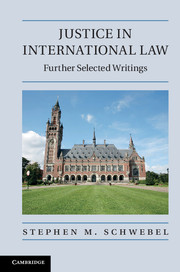Book contents
- Frontmatter
- Contents
- PART I International Court of Justice
- PART II International arbitration
- PART III Miscellaneous
- 27 May preparatory work be used to correct rather than confirm the “clear” meaning of a treaty provision?
- 28 Clean hands, principle
- 29 Compound interest in international law
- 30 The prescience and pertinence of the ILO
- 31 Is mediation of foreign investment disputes plausible?
- 32 Hersch Lauterpacht: fragments for a portrait
- 33 International Law: Being the Collected Papers of Hersch Lauterpacht
- Collected publications, judicial opinions and book reviews
- Index
28 - Clean hands, principle
from PART III - Miscellaneous
Published online by Cambridge University Press: 07 September 2011
- Frontmatter
- Contents
- PART I International Court of Justice
- PART II International arbitration
- PART III Miscellaneous
- 27 May preparatory work be used to correct rather than confirm the “clear” meaning of a treaty provision?
- 28 Clean hands, principle
- 29 Compound interest in international law
- 30 The prescience and pertinence of the ILO
- 31 Is mediation of foreign investment disputes plausible?
- 32 Hersch Lauterpacht: fragments for a portrait
- 33 International Law: Being the Collected Papers of Hersch Lauterpacht
- Collected publications, judicial opinions and book reviews
- Index
Summary
The principle of “clean hands” has its roots in Roman law. It finds expression in maxims of Roman law: ex dolo malo non oritur actio, nullus commodum capere potest de injuria sua propria, and ex injuria jus non oritur.
The most notable exposition and application of the principle (or more precisely, of an allied principle) in modern international law is found in opinions rendered by the Permanent Court of International Justice (PCIJ) in The Diversion of Water from the Meuse (Judgment) (Netherlands v Belgium) (“Meuse Water case”) (Meuse, Diversion of Water case [Netherlands v. Belgium]). The Netherlands and Belgium maintained that acts of the opposing party in the extraction and use of waters of the River Meuse were inconsistent with governing treaty obligations. In an individual opinion, Judge Hudson observed that:
It would seem to be an important principle of equity that where two parties have assumed an identical or a reciprocal obligation, one party which is engaged in continuing non-performance of that obligation should not be permitted to take advantage of a similar non-performance of that obligation by the other party. The principle finds expression in the so-called maxims of equity which exercised great influence in the creative period of the development of Anglo-American law … “[A] court of equity refuses relief to a plaintiff whose conduct in regard to the subject-matter of the litigation has been improper”. […]
- Type
- Chapter
- Information
- Justice in International LawFurther Selected Writings, pp. 297 - 301Publisher: Cambridge University PressPrint publication year: 2011



